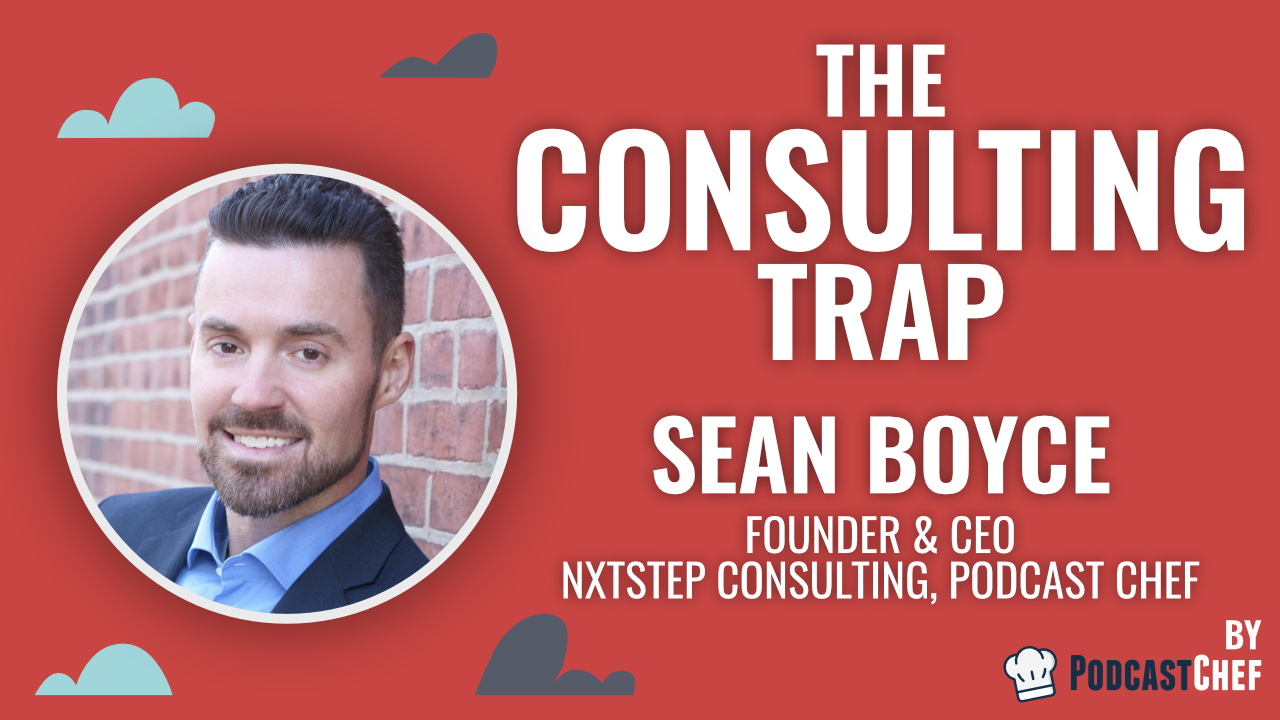This episode, the Founder of NxtStep Consulting Sean Boyce talks about the value of relationship development in selling, how to nurture a relationship from introduction to friendship, and ways to scale relationship development for business development.
Sean Boyce has run his consultancy firm NxtStep Consulting for over 10 years but found he wasn’t able to grow his network effectively and efficiently through in-person marketing or lead generation services. To solve this Sean founded Podcast Chef, a full-service podcast management platform that helped him grow his network while making awesome content at the same time. Seeing the effectiveness of podcasting at reaching new people, Sean opened it up to others, helping people to start a podcast and delegating the management from post-production to booking guests. Here are a few of the topics we’ll discuss on this episode of The Consulting Trap:
- The results of email outbound marketing.
- The problems of going straight to a sale.
- The value of relationship development in selling.
- Efficient ways to build relationships with someone in your target market.
- How to nurture a relationship from introduction to friendship.
- The importance of knowing who you’re speaking to.
- How to determine the return on investment of building relationships.
- How to scale relationship development.
Resources:
Connecting with Sean Boyce:
Connecting with the host:
Quotables:
- 2:16 – “Have you ever been in one of those situations when somebody’s standing on the street corner handing out flyers for a local mattress sale business like I’m a pedestrian this a great use of your advertising budget to give handouts for mattresses while I don’t have the ability to carry one home, what is the thinking process behind it. Like the folks that advertise on the dinner place mats like ah I need to find my next realtor where am I going to find him? Well, I’m hungry for pie too so let’s bounce out to the diner and see if I can find a realtor and I think the email response rates that whole shotgun model and the way that works is broken in a lot of ways.”
- 4:43 – “I came up with a list of 10 things that I felt I could offer someone that they might be interested in more so than hey you buy this and it was like be a guest on my blog, let’s go a video together, be a guest on my podcast, participate in a research project whatever it was I got a list of 5 to 10 of those and then I ran an experiment myself under my own LinkedIn profile where across lists of prospects that I had created in Sales Navigator and then I sent messages of a certain type inserting each one of those options over a period time and sending about the same volume of messages to people in those target lists to then evaluate ok who responds, when do they respond, what type of response do I get so that I could measure the performance of how they all did against one another.”
- 8:04 – “It comes off as though you’re trying to use the individual you’re connecting and that you only have some type of financial achievement in mind and it’s going to seem disingenuous and it’s going to seem like you don’t really care about them so instead approach it like you would anybody else looking to make friends looking to date whatever it is express and show genuine interest in them look for ways to actually connect with them learn more about them what are their hobbies and interests what are they passionate about why do they do the work that they do all of these are great examples in terms of how to start building a relationship.”
- 12:24 – “You really need to be speaking to a specific person, at least a personna but that personna shouldn’t deviant a whole lot the conversation you’re going to have with the sales person vs. the marketing person vs. the CEO vs. the CFO those are all at least probably four different types of conversations so if you’re saying something that might encourage a CEO to respond that may or may not get a response from a CFO and vice versa so you really need to know who you’re speaking to.”
- 20:04 – “Someone who was overwhelming successful in selling cars back in the day and the way that they did that is they had uber personal relationships with the people that they met and buying a car is very much a timing thing as in everyone who comes into a dealership or as you said walking around on the sidewalk is not necessarily in the position or at the right time to purchase a car, that’s a major expense so instead what said individual was doing was writing a lot of actual snail mail, writing postcards to people, keeping track of birthday making sure that they stayed too of mind for them but expressed genuine interest in the things that were going on in their lives not hey I’ve got a deal for you kind of stuff more like hey happy birthday I just wanted to say hello and I hope everything’s going well and the rest of the case study plays out that had built such strong relationships for said indivisible that whenever it came to purchasing cars everyone always came to him.”
